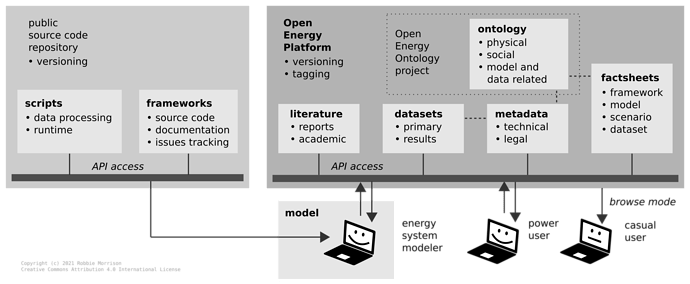On 20 January 2021 (three days ago), I attended the closing meeting for the SzenarienDB energy scenarios database project. This three year project spanned four universities and research institutes in Germany and was funded by the German BMWi economics ministry.
The aim of the project was to create a platform for storing and serving energy system scenarios and their associated datasets.
The idea was to move beyond a simple repository for archiving digital artifacts (like Zenodo for instance) and offer features to support the transparency and reproducibility of the analysis itself. The backend infrastructure is provided by the Open Energy Platform (OEP) project. The OEP currently offers 180 TB of secure storage and serves data accessed more often more rapidly (known as hot/cold storage).
The SzenarienDB project requires that suitable open licenses be applied to uploaded material. The database can also track and report license compatibilities for information being remixed and potentially republished.
Consistent semantics lies at the heart of the SzenarienDB database and the project has supported the development of the Open Energy Ontology (OEO). The platform uses what is known as variously ontology‑based data access (OBDA) and ontology‑based data integration. For more on the OEO itself:
- [OEO] Open Energy Ontology for Energy System Modeling published
- https://forum.openmod.org/tag/ontologies
The overall architecture is shown below (loosely based on Reder et al 2020):
As noted, the Open Energy Platform provides the backend support for storing primary and resultant datasets and associated metadata and the details of the investigated scenarios using structured factsheets. Treating scenarios as first class data is a relatively novel idea and forms the basis of this scheme. The platform can help promote more standardized data collection and reporting and thereby improve cross‑scenario comparisons. The platform also supports information reviews and ratings stars to assist with quality assurance and engender confidence.
Extensions to the architecture depicted are being discussed, including the use of linked open data (LOD) techniques to broaden the information universe. This project is also part of a wider family of projects to support energy system information management.
@ludwig.huelk is the community manager for the project and may be contacted via this site.
To close, a reminder that the Open Energy Modelling Initiative provides forums for researchers to promote their work but does not itself advocate policy positions or endorse individual projects. For disclosure, I serve voluntarily on the OEO steering committee but am not associated with the SzenarienDB project otherwise.
My follow‑up recommendations, also listed below: Stappel et al (2020) video and Reder et al (2019) poster.
SzenarienDB project websites
-
Fraunhofer IEE (2021). SzenarienDB (in German). Fraunhofer-Institut für Energiewirtschaft und Energiesystemtechnik (IEE). Kassel, Germany. Project outline.
-
RLI (2 March 2018). SzenarienDB. Reiner Lemoine Institut. Berlin, Germany.
Posters
-
Reder, Klara, Carsten Pape, Mirjam Stappel, Hannah Förster, Lukas Emele, Christian Winger, Ludwig Hülk, Christian Hofmann, Editha Kötter, Martin Glauer, and Till Mossakowski (2019). Scenario data on the Open Energy Platform (SzenarienDB on the OEP): a web-platform to improve transparency and reproducibility of energy system analyses — Poster. Kassel, Germany: Fraunhofer Institute for Energy Economics and Energy System Technology (IEE).
-
Stappel, Mirjam and Klara Reder (December 2018). User requirements on a database for energy scenarios — Poster. Kassel, Germany: Fraunhofer Institute for Energy Economics and Energy System Technology (IEE).
Videos
-
Stappel, Mirjam, Klara Reder, Hannah Förster, Lukas Emele, Christian Winger, Martin Glauer, Till Mossakowski, Christian Hofmann, and Ludwig Hülk (3 October 2020). Project SzenarienDB: open database infrastructure for open data storage and publication of energy scenario data. Berlin, Germany: Reiner Lemoine Institute (RLI). Presented at EMP‑E 2020 by Mirjam Stappel. Video 03:29.
-
RLI (2 October 2020). Open Energy Ontology: an ontology for the domain of energy system modelling. Berlin, Germany: Reiner Lemoine Institute (RLI). Presented at EMP‑E 2020. Video 02:57.
-
Hofmann, Christian (10 August 2020). The Open Energy Ontology (OEO): an ontology for the domain of energy system modelling. Open Energy Modelling Initiative (openmod) mini‑workshop. Video 08:50.
Preprints
- Glauer, Martin, Meisam Booshehri, Lukas Emele, Simon Fluegel, Hannah Förster, Johannes Frey, Ulrich Frey, Janna Hastings, Christian Hofmann, Carsten Hoyer‑Klick, Ludwig Hülk, Anna Kleinau, Kevin Knosala, Leander Kotzur, Patrick Kuckertz, Till Mossakowski, Fabian Neuhaus, Martin Robinius, Mirjam Stappel, and Detlef Stolten (December 2020). “The Open Energy Ontology — Preprint”
Academic papers
- Reder, Klara, Mirjam Stappel, Christian Hofmann, Hannah Förster, Lukas Emele, Ludwig Hülk, and Martin Glauer (24 January 2020). “Identification of user requirements for an energy scenario database”. International Journal of Sustainable Energy Planning and Management. 25: 95–108. ISSN 2246-2929. doi:10.5278/ijsepm.3327. Creative Commons CC‑BY‑NC‑ND‑3.0 license.
